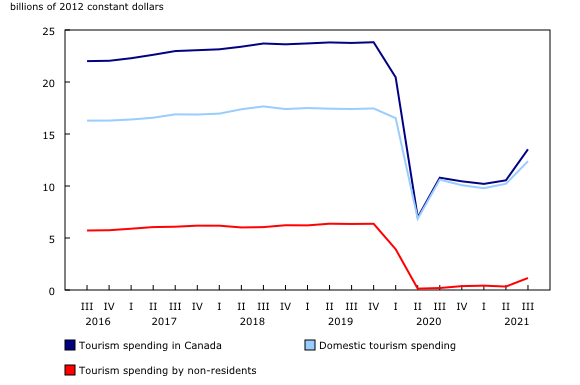U.S. CDC advises Americans to avoid travel to Canada
The U.S. Centers for Disease Control and Prevention (CDC) on Monday advised against travel to Canada because of a rising number of COVID-19 cases.
The CDC elevated its travel recommendation to “Level Four: Very High” for Canada, telling Americans they should avoid travel to its northern neighbor. The CDC currently lists about 80 destinations worldwide at Level Four. It also raised the island of Curaçao to Level Four on Monday.
The United States in November lifted restrictions at its land borders with Canada and Mexico for fully vaccinated foreign nationals, ending historic curbs on non-essential travelers in place since March 2020 to address the COVID-19 pandemic.
Canada remains one of the top foreign destinations for Americans.
Click here for more information.
Tourism spending in Canada up in Q3 2021
Tourism spending in Canada rose 28% in the third quarter, following a 3.3% increase in the previous quarter. Tourism gross domestic product (GDP) rose 31%, while employment attributable to tourism grew by 18%. Statistics Canada finds that this growth likely occurred as a result of pandemic restrictions easing throughout the third quarter, with the number of people with two doses of an approved COVID-19 vaccine doubling from the beginning of July to the end of September. Fully vaccinated travellers from the United States were allowed entry into Canada for non-essential travel beginning on August 9, 2021, while the remainder of international discretionary travellers were allowed entry on September 7.
Food and beverage services (+35.8%), accommodation (+27.0%) and recreation and entertainment (+69.3%) saw significant growth in the third quarter. Spending by Canadians was up 21%, but spending by international travellers increased by 247%.
All figures are still significantly below pre-pandemic levels, however, and the return of restrictions in response to the Omicron variant will likely stunt regrowth in Q4 2021 and Q1 2022.
Click here for more information.
27,585 excess deaths in Canada reported from March 2020 to October 2021
Based on provisional data released today, an estimated 27,585 excess deaths were reported in Canada from March 2020 to the beginning of October 2021—6.3% more deaths than what would be expected were there no pandemic—after accounting for changes in the population, such as aging. Over this same period, 26,750 deaths occurred that were directly attributed to COVID-19.
To understand both the direct and indirect consequences of the pandemic, it is important to measure excess mortality, which occurs when there are more deaths than expected in a given period. It should be noted that, even without a pandemic, there is always some year-to-year variation in the number of people who die in a given week. This means that the number of expected deaths should fall within a certain range of values. There is evidence of excess mortality when weekly deaths are consistently higher than the expected number, but especially when they exceed the range of what is expected over several consecutive weeks.
Click here for more information.
Reading Recommendations
Could a new tax on homes worth $1M and up help fix Canada’s housing crisis?
CBC News
With home prices in Canada’s most expensive markets going up at a dizzying pace, a Vancouver-based think-tank is proposing a new tax on homes valued at over $1 million to help bridge the affordability gap.
Although Canada’s housing market went ice cold when the pandemic began in March 2020, it soon came roaring back and spent much of 2021 on fire. Average prices across the country rose to their highest level on record at more than $720,000 in November, and despite those high prices, the year smashed the annual sales record, too, with more than 630,000 homes changing hands.
The torrid pace has prompted fears of a painful comeuppance if the market goes off the rails, but so far none of the targeted solutions suggested so far — from taxes on vacant homes, flippers and foreign investors to an end to blind bidding — have managed to slow the runaway freight train where they’ve been tried.
New numbers this week from Canada’s two most expensive housing markets, Toronto and Vancouver, show those market pushing further into the stratosphere.
Canada isn’t responding with foresight when it comes to COVID-19
The Conversation
Global problems require global solutions. With COVID-19, however, we’re seeing that our governance mechanisms don’t drive global solutions even when our lives depend on it.
This is a problem because it will lead to diminishing trust in public institutions and a dragged-out pandemic response, as we fail to prevent deaths, long-term disability and lasting economic hardship of millions.
To end this pandemic, Canada must act with foresight, but what does that mean?
Niagara COVID-19 statistics tracker
Niagara COVID vaccination tracker
Free rapid COVID-19 testing kits are now available to businesses. Visit gncc.ca/workplace-self-screening-kits to learn more and reserve kits for your organization.
For information on rapid testing kits for individuals, click here.
Information on government grants, resources, and programs, policies, forms, and posters for download and use, are available here. The GNCC is here to support you. Contact us with any questions you have.
Through the Daily Updates, the GNCC aims to deliver important business news in a timely manner. We disseminate all news and information we feel will be important to businesses. Inclusion in the Daily Update is not an endorsement by the GNCC.




